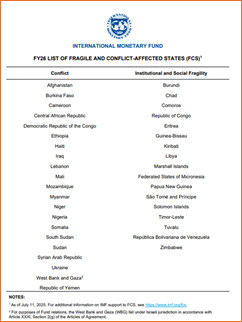There are moments in a nation’s journey when the truth can no longer be dressed up in diplomatic language. Nigeria’s classification in July 2025 as a Fragile and Conflict Affected State by the IMF, along with the World Bank, is one of those moments. It is not just another report tucked away in think-tank archives. It is a clarion call. This crisis is a thunderous reminder that the house the nation’s heroes built in the past is cracking at its very foundation.

Source: IMF FY’26 FCS List
Let us be clear: Nigeria did not arrive at this tragic designation overnight. It reflects years, indeed decades, of squandered opportunities and poor governance. Most painfully, it reflects the absence of sound political leadership at the centre of power.

Missing the Signs and Ignoring the Symptoms
For nearly two decades Nigeria has hovered in danger zones of the Fragile States Index. We have endured Boko Haram and ISWAP insurgencies in the northeast, militancy in the Niger Delta, and farmer‑herder violence that has turned productive farmlands into killing fields. Institutions became hollowed out by corruption and ineptitude. Government policies were unable to diversify an economy dangerously reliant on oil. Every warning sign was there. The failure to act decisively on security, governance, and economic reform was a political choice. The result? A flagging state barely holding itself together.
Yet, Nigeria is far from powerless. I stay firmly optimistic. And here is why:
Non‑Oil Export Boom
In Q1 2025, Nigeria’s non‑oil exports surged by 24.75%, totaling $1.791 billion. This is its highest Q1 performance ever. Export volume increased by over 243%, with 197 distinct products shipped across manufactured goods, cocoa, cashews, urea, rubber, and more. The full‑year 2024 non‑oil export figure rose 20.77% year‑on‑year to approximately $5.456 billion.
Fast‑Growing Tech & Innovation Sector
Lagos is emerging as Africa’s top tech hub. It hosts most of the continent’s fastest‑growing firms. This is particularly true for fintechs like PalmPay, Paystack, Flutterwave, and Moniepoint. PalmPay alone now has 35 million registered users and around 1 million small‑business clients, demonstrating deep mass‑market adoption.
Major Tech Skills Initiative
The 3 Million Technical Talent (3MTT) programme is training Nigerians in AI, cloud computing, data science, and more. There is a target of skilling 3 million citizens by 2027. This will lay the groundwork for a digital workforce.
Transformative Agri‑Innovations & Commodities Exchange
Nigeria leads the world in cassava, yam, sorghum, cowpea, rubber, cocoa, and palm oil production. The private AFEX Commodities Exchange has integrated over 500,000 smallholder farmers into a transparent digital market. It is handling more than 1 million metric tonnes via its platform, ComX.
Local Ownership of Oil & Gas Assets
Indigenous firms are stepping up. Green Energy built the first locally operated crude terminal. Seplat and Renaissance Africa Energy are investing billions to reopen wells and boost output. They now produce more than half of Nigeria’s oil yield.
The Danger of Ignoring This Red Flag
To dismiss the fragile‑state label as mere foreign pessimism would be reckless. A fragile Nigeria threatens:
- Security: Fragility emboldens violent non‑state actors.
- Economy: Investors avoid unstable markets; brain‑drain accelerates.
- Institutions: Continued collapse of confidence in the state risks national cohesion.
- Region: Destabilised Nigeria weakens ECOWAS and threatens the broader Sahel.
The real question is not whether we can afford to act. It is whether we can afford not to act. Nigeria’s resurgence hinges on political leadership with vision, integrity, and courage. When public office becomes a transactional prize instead of a service to citizens, fragility becomes inevitable. We must demand better. Real change requires more than policy documents. It demands political will. The country faces a leadership test it can’t afford to fail.
The Five-Point Pathways to Declassifying Nigeria’s Fragility
Despite this grim diagnosis, I stay cautiously optimistic. Nigeria has stumbled before and risen. The resilience of its people, its enormous human capital, and the abundant resources are not in doubt. What is missing is political courage and visionary leadership.
To get off this slippery slope of fragility, Nigeria must urgently consider a five-point agenda:
First, it must reclaim security not with rhetoric but through strategy. This entails professionalising and properly equipping the military and police. Resolving the farmer–herder crisis with enforceable land use reforms can no longer be put off. It must also strengthen regional security alliances, especially around the Lake Chad Basin.
Second, Nigeria must rebuild governance and trust. The Economic and Financial Crimes Commission (EFCC) and the Independent Corrupt Practices Commission (ICPC) are seen as working for politics. They are perceived as serving political interests rather than the people. Real or perceived, government must change this. It must overhaul these critical anti-corruption institutions to be seen as working for the people. Decentralising governance to bring services closer to communities has inevitably become a priority. So too is the restoration of the independence of the judiciary and rule of law.
Third, all efforts to rewire the economy beyond oil must receive a boost. This presupposes an aggressive continuation of diversification into agriculture, manufacturing, and digital innovation. It entails an expansion of social protection schemes for the most vulnerable. With the same gusto, investment in job creation and rural development initiatives must be incentivised.
Fourth, Nigeria must genuinely adapt to climate and demographic pressures. Key action points include investment in sustainable agriculture and renewable energy. It must also tackle desertification and flooding with data and science driven policies.
Finally, fostering national dialogue and social cohesion. Promotion of interethnic and interfaith dialogue must be deployed if fractures are to be healed. A select number of policies must be implemented to give every Nigerian a genuine sense of belonging.
In the final analysis, Nigeria may be fragile but it should not feel defeated. This fragile state classification is not just a label. It is a warning. Nigeria’s emerging economic strengths show that turnaround is possible. The country has a vibrant young population and agricultural dominance. There is booming tech innovation and policy momentum. But it will take leadership that recognizes red flags, embraces positive trends, and acts boldly. Nigeria stands at a crossroads. Fragility was built brick by brick by poor leadership. Only bold leadership can dismantle the bricks. History will not forgive those who saw the red flags and looked away. But it will remember those who seized this crisis, harnessed Nigeria’s strengths, and built a stronger, more inclusive nation. The time is now.
About the Author
The author, Collins Nweke is a former Green Councillor at Ostend City Council, Belgium, where he served three consecutive terms until December 2024. He is a Fellow of both the Chartered Institute of Public Management of Nigeria and the Institute of Management Consultants. He is also a Distinguished Fellow of the International Association of Research Scholars and Administrators, serving on its Governing Council. He writes from Brussels, Belgium. X: @collinsnweke E: admin@collinsnweke.eu W: www.collinsnweke.eu
Stay ahead with the latest updates!
Join The Podium Media on WhatsApp for real-time news alerts, breaking stories, and exclusive content delivered straight to your phone. Don’t miss a headline — subscribe now!
Chat with Us on WhatsApp







